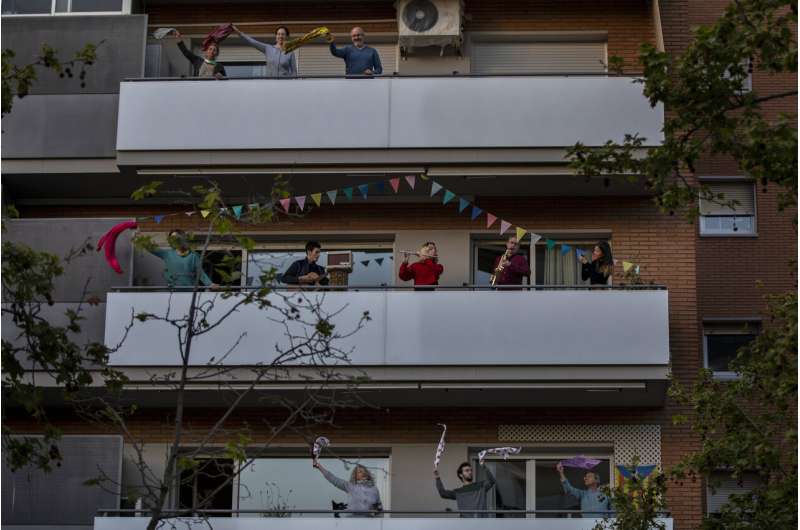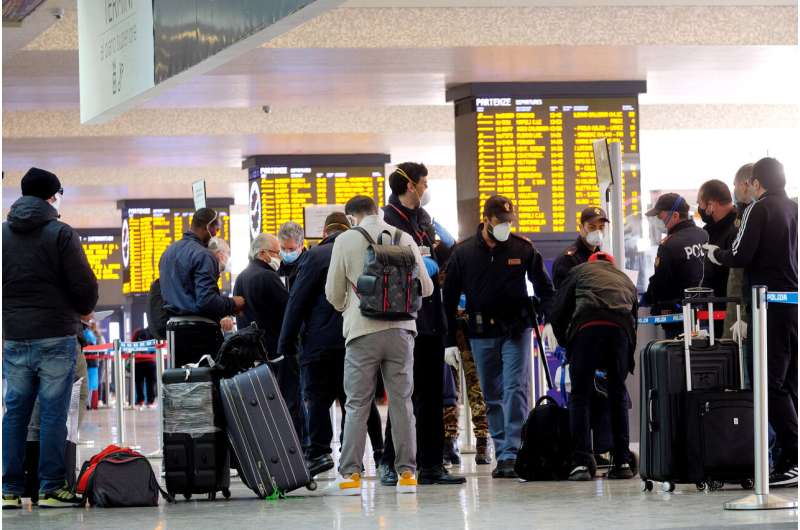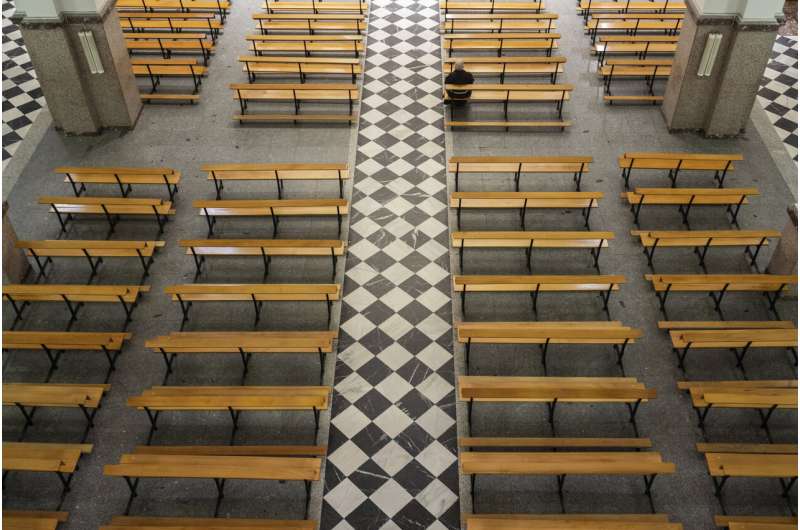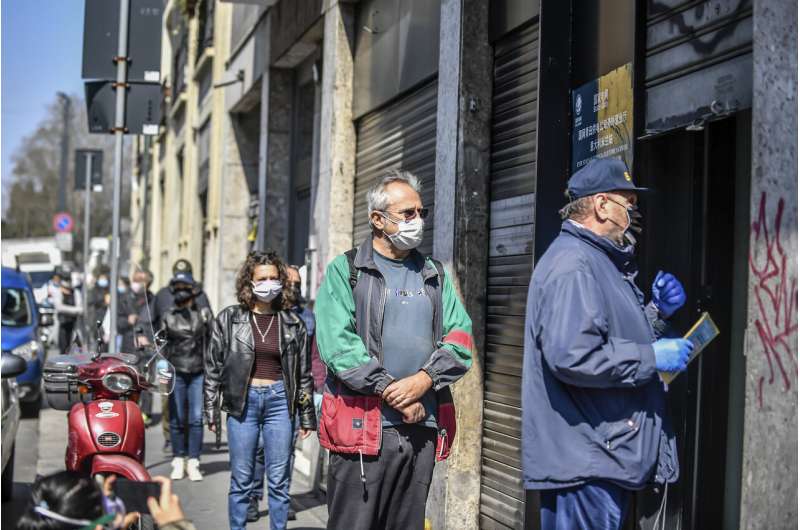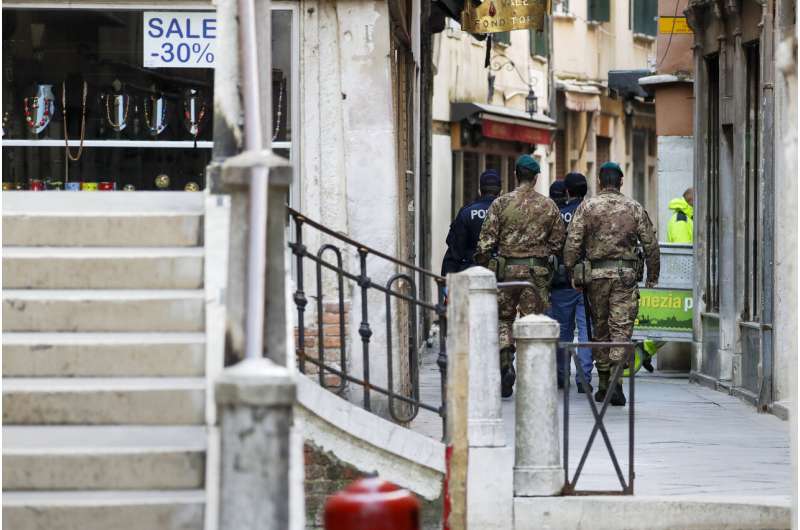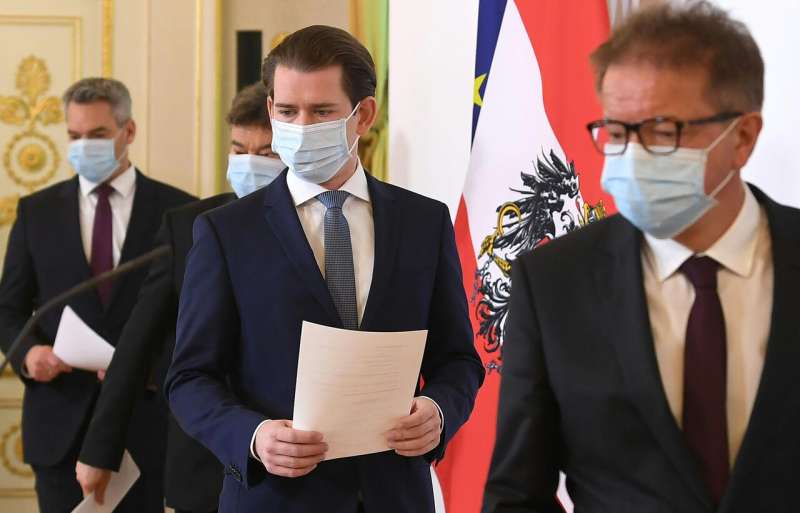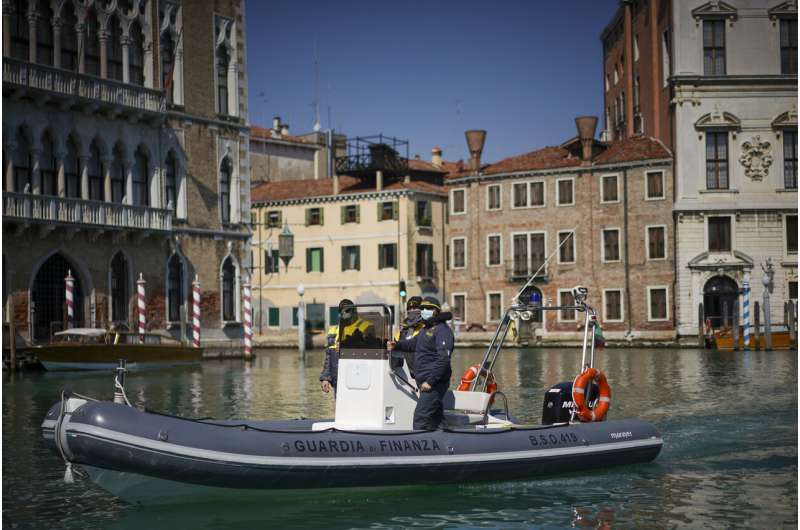People play instruments as other dance on their balconies in support of the medical staff that are working on the COVID-19 virus outbreak in Barcelona, Spain, Sunday, April 5, 2020. Spanish Prime Minister Pedro Sanchez announced that he would ask the Parliament to extend the state of emergency by two more weeks, taking the lockdown on mobility until April 26. The new coronavirus causes mild or moderate symptoms for most people, but for some, especially older adults and people with existing health problems, it can cause more severe illness or death. (AP Photo/Emilio Morenatti)
A week ago, emergency rooms and intensive care wards in Spain and Italy were overflowing with woozy, coughing coronavirus patients and literally buzzing with breathing machines.
So many died that Barcelona crematories have a waiting list of up to two years, forcing some people to bury loved ones temporarily in cemeteries with the expectation of exhuming them for cremation later on.
But now the two countries that have suffered more virus deaths than anywhere else in Europe are starting to see their crisis ease, while Britain, where the prime minister has been hospitalized, seems headed in the opposite direction.
Between them, Italy and Spain saw nearly 30,000 deaths and 265,000 confirmed infections in the pandemic. They, and other European countries that locked down weeks ago and ramped up testing, are now seeing the benefits.
Britain's outbreak was headed in the opposite direction as the country reported more than 600 deaths Sunday, surpassing Italy's daily increase for the second day in a row.
"I think that we are just a week away from the surge of this," the deputy chief executive of Britain's NHS Providers, Saffron Cordery, told Sky News.
In Spain, deaths and new infections dropped again on Monday. The health ministry reported 637 new fatalities, the lowest toll in 13 days, for a total of over 13,000 dead. New recorded infections were the lowest in two weeks.
Police check passengers at the Termini train station following Italy's lockdown due to the coronavirus emergency, in Rome, Monday, April 6, 2020. The new coronavirus causes mild or moderate symptoms for most people, but for some, especially older adults and people with existing health problems, it can cause more severe illness or death. (Mauro Scrobogna/LaPresse via AP)
Emergency rooms in the hard-hit Madrid region of 6.6 million were returning almost to normal a week after scenes of patients sleeping on floors and in chairs.
Patients awaiting treatment in Madrid-area ERs went down Monday to 390 cases, one-tenth of the arrivals last week, the regional government said. The number of people being treated for coronavirus in intensive care stabilized at about 1,500 for five straight days.
Transport, Mobility and Urban Affairs Minister José Luis Ábalos said the figures show Spain is entering "a new phase of the battle."
"This new phase does not mean we can let down our guard. We are assessing the measures that we will need to adopt," Ábalos said.
At the San Carlos Clinic Hospital in Madrid, nearly 15% of the hospital's 1,400-strong staff contracted the coronavirus, in line with the national average,
A Catholic priest sits on an empty bench due to social distancing guidelines during the coronavirus outbreak inside the Jesus de Medinaceli church on Palm Sunday in Madrid, Spain, Sunday, April 5, 2020. The new coronavirus causes mild or moderate symptoms for most people, but for some, especially older adults and people with existing health problems, it can cause more severe illness or death. (AP Photo/Bernat Armangue)
"Our priority at the moment is to bring health workers back to work," said Dr. Julio Mayol, the facility's medical director.
Still, there are fears for a new outbreak as Spanish authorities begin talking about loosening the grip on mandatory confinement, and the strain on hospitalizations will still be seen for another week while that in intensive care units for another two weeks, Mayol said.
Italy still has, by far, the world's highest coronavirus death toll—almost 16,000—but the pressure on northern Italy's ICUs has eased so much that Lombardy is no longer airlifting patients to other regions.
In the northern city of Bergamo, one of Europe's virus epicenters, hospital staff were still pulling long, difficult shifts even if the numbers of new patients had eased a bit.
"There has been no reduction in the work," said Maria Berardelli, a nursing coordinator at Pope John XXIII hospital. "There have been fewer admissions to the emergency room, but our intensive care units are still full, so the activity hasn't been reduced."
People line-up to get medical masks that are being distributed by the Chinese state-owned State Grid electrical company, at Milan's Chinatown neighborhood, Italy, Monday, April 6, 2020. The new coronavirus causes mild or moderate symptoms for most people, but for some, especially older adults and people with existing health problems, it can cause more severe illness or death. (Claudio Furlan/LaPresse via AP)
In a public housing project in the city of Seville, 90-year-old Manuela Jiménez has been confined to her home for more than 20 days. She speaks to neighbors from her window as they deliver food and says she has never seen anything like it, despite having lived through the Spanish Civil War and Second World War.
"Back then my mother would lock me up and I would stay calm but now, look, there is my neighbor and I can't see her", says Jiménez.
Illness has been compounded by shocking economic pain as all the world's largest economies have ground to a halt, including in Italy and Spain. In France, which slightly trails its two neighbors to the south in deaths and infections, the government shut the country down two days after Italy—and has also seen a slight easing.
The U.K. initially resisted taking some of the tough measures seen in other European countries, which banned large events, shut schools and closed their borders to slow the spread of the COVID-19 illness.
-
Police officers and soldiers patrol streets to enforce the lockdown, in Venice, Monday, April 6, 2020. The government is demanding Italians stay home and not take the leveling off of new coronavirus infections as a sign the emergency is over, following evidence that more and more Italians are relaxing restrictions the west's first and most extreme nationwide lockdown and production shutdown. The new coronavirus causes mild or moderate symptoms for most people, but for some, especially older adults and people with existing health problems, it can cause more severe illness or death. (AP Photo/Andrew Medichini)
-
Austrian ministers, with from left: Austrian Interior Minister Karl Nehammer, Vice Chancellor Werner Kogler, Chancellor Sebastian Kurz and Minister for Social Affairs Rudolf Anschober arrive for a news conference about the coronavirus situation in Austria, in Vienna, Austria, Monday, April 6, 2020. The COVID-19 coronavirus causes less serious symptoms for most people, but for some it causes severe illness and even death.(Helmut Foringer/Pool via AP)
-
Financial Police patrols Canal Grande, in Venice, Monday, April 6, 2020. The government is demanding Italians stay home and not take the leveling off of new coronavirus infections as a sign the emergency is over, following evidence that more and more Italians are relaxing restrictions the west's first and most extreme nationwide lockdown and production shutdown. The new coronavirus causes mild or moderate symptoms for most people, but for some, especially older adults and people with existing health problems, it can cause more severe illness or death. (AP Photo/Andrew Medichini)
The government's first advice was that people should wash their hands frequently. As the number of cases soared, the response escalated to include the closure of schools, bars, restaurants and non-essential shops and a nationwide order for everyone but key workers to stay home.
Now, Austria and the Czech Republic are openly discussing how to ease some of the crippling restrictions. Austria's chancellor said the plan is to let small shops and garden centers reopen next week, with limits on the number of customers inside, and the rest on May 1. The Czech government is proposing an end to the ban on travel abroad as of April 14 and the reopening of small stores.
© 2020 The Associated Press. All rights reserved. This material may not be published, broadcast, rewritten or redistributed without permission.
